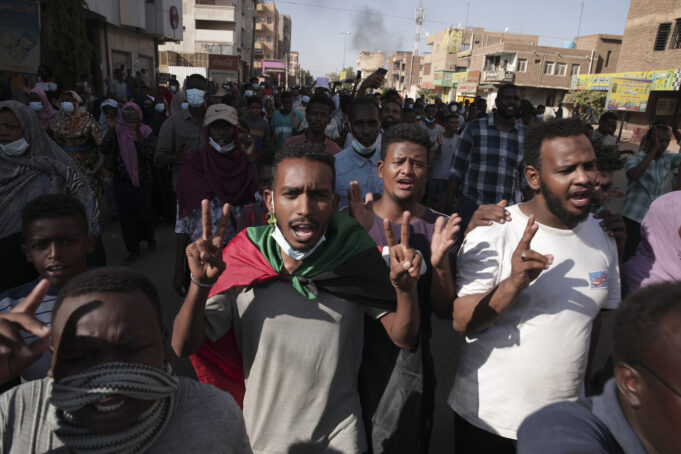The death toll from Sudan’s political uprising had reached 39 fatalities, reported a pro-democracy doctors union at Final Call press time. Hundreds of thousands of Sudanese, twice in less than one week, hit streets to keep protesting a military coup by Sudan’s Sovereign Council Chief General Abdel Fattah al-Burhan and call for the installation of a civilian run democratic government.
During the recent protests, marchers chanted, “No to military power” amid clouds of tear gas.

There were 15 deaths during a workday protest, all in Khartoum, especially in the capital city’s northern districts with hundreds of injuries, many from gunshot wounds. But the deaths were denied by Sudanese security forces and Burhan, in an interview with Al-Jazeera.
The sentiments of many Sudanese people were expressed to Africa Watch by Dr. Mohammed Ismail Abdelmohssin, who said via WhatsApp, “Forward ever, backwards never. We Sudanese decided that we will go for a civilian democratic government and we will succeed.”
Professor Abdelmohssin has a PhD. from Stanford University and worked with NASA. He arranged for this writer while staying in Sudan to address students and faculty at the Khartoum-based University of Medical Sciences and Technology. Professor Abdelmohssin said he hopes Black publications like The Final Call will highlight the revolt of the Sudanese people against the actions of an oppressive military regime.
This writer’s wife, Zakia Sadeeg, participated in three recent demonstrations. She witnessed the shooting of a protestor, apparently by security forces, and said via an app she “sadly” believes the military may get its way. Asked to explain, Sadeeg, who is an executive at Sudan’s Call Of Future Campaign, said most people are “naive.”
It’s already been reported in the press that during negotiations while under house arrest, Prime Minister Abdalla Hamdok was being encouraged to work out a deal with Burhan, she said. “People shouldn’t be surprised,” she said, adding that Hamdok and the civilian side of the transitional government have always been under the thumb of the military side of the transition government.
U.S. Special Envoy for the Horn of Africa Jeffrey Feltman confirmed Sadeeg’s analysis. He spoke recently of “an understanding by the Sudanese people themselves that they have to be careful and find a way back to the civilian-military partnership this transition requires.”
Burham tightened his reins on power Nov. 11 by reappointing himself as head of the army-run interim government. He announced the formation of a new Sovereign Council headed by himself. He said he’s keeping Mohamed Hamdan Dagalo (also known as Hemedti), commander of the Rapid Support Forces, as his second in command.
According to theafricareport, “The men who make up this powerful paramilitary group have been repeatedly accused of abuses, including during the (2018-19) uprising that helped remove (Omar al-Bashir) from power.”
Rallies broke out across the capital though telephone lines were cut and internet services were disrupted since the Oct. 25 power grab, AFP journalists reported.
Demonstrations also took place in Port Sudan, an AFP journalist said. The coup halted a democratic transition that followed the 2019 toppling of longtime ruler Omar al-Bashir.
Efforts to stem protests have resulted in hundreds of arrests, including activists, passersby and journalists. Qatari network Al Jazeera’s bureau chief was arrested and released. Security forces have invaded hospitals apparently to arrest injured protestors.
While demonstrations erupted throughout Sudan and with civil war growing in Ethiopia, U.S. Secretary of State Antony Blinken arrived in Kenya and appealed for the “preservation of democracy in politically and ethnically fractured societies,” reported the Associated Press.
Blinken said the most important move Sudan could make to “restore international confidence” is for Burhan to bring back the civilian-led government with Hamdok as prime minister.
Sadeeg said this is the return to “business as usual that I feared.” “We can’t allow our martyred countrymen to have died in vain,” she said.
Follow @jehronmuhammad on Twitter.













